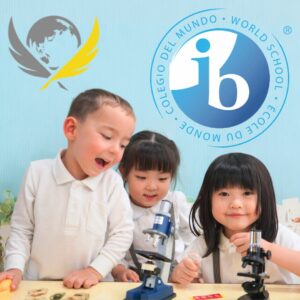Building Global Citizens- Starting in Kindergarten
幼稚園から育むグローバルシチズンシップ
One of the core aims of the IB Primary Years Programme (PYP) is to nurture international mindedness—the ability to appreciate and respect diverse cultures, perspectives, and languages.
IB初等教育プログラム(PYP)の大切な目標の一つが、「国際的な心」の育成です。
It all begins in kindergarten, where children’s natural curiosity and openness create a perfect foundation for global understanding.
幼稚園から始まり、子どもたちの好奇心と素直さが、世界への理解の土台となります。
What Is International Mindedness?
国際的な心とは?
International mindedness means seeing ourselves as part of a larger global community.
国際的な心とは、自分を大きな世界の一員として考えること。
It’s about being curious about others, recognizing what we share, and respecting differences- whether in culture, language, beliefs, or ways of life.
他者に興味を持ち、共通点を見つけ、文化や言語、信念、生活様式の違いを尊重することです。
In kindergarten, this translates to simple, age-appropriate experiences that open children’s eyes and hearts to the world beyond their immediate surroundings.
幼稚園では、年齢に合った体験を通して、身近な世界の外にも目を向け、心を広げます。
How We Encourage It Daily
日々どのように育んでいるか
- Exploring Languages: At our school in Japan, children are exposed to both Japanese and English, building early bilingual skills and understanding that communication comes in many forms.
言語の探究:日本語と英語の両方に触れ、バイリンガルの基礎を築き、コミュニケーションが多様であることを学びます。 - Celebrating Diversity: We learn about different cultures through stories, music, festivals, and food from around the world. Children might dress up in traditional clothes or listen to folktales from other countries.
多様性を祝う:世界中の物語や音楽、お祭り、食べ物を通して文化を学び、伝統衣装を着たり、外国の昔話を聞いたりします。 - Developing Empathy: Through role play and classroom discussions, children practice caring for others and thinking about different points of view.
共感力を育てる:ロールプレイや話し合いを通して、他者への思いやりや様々な視点を考える力を養います。 - Global Units of Inquiry: Themes like “Sharing the Planet” encourage children to think about how people worldwide can work together to protect the environment.
グローバルな探究単元:「地球を分かち合う」などのテーマで、世界中の人々が協力して環境を守ることを考えます。
Balancing Local and Global
地域と世界のバランス
Fostering international mindedness in Japan means helping children value their own culture while understanding others.
日本で国際的な心を育むとは、自分の文化を大切にしつつ他文化も理解することです。
For example:
たとえば:
- Learning about Japanese festivals alongside global holidays like Diwali or Lunar New Year.
日本の祭りと、ディワリや旧正月など世界の祝日を一緒に学ぶ。 - Discussing local customs and manners, then comparing them with those in other countries.
地域の習慣やマナーを話し合い、他国と比べる。 - Encouraging respect for nature, a strong part of Japanese culture, as a shared global value.
自然への敬意を、日本文化の重要な要素として、世界共通の価値観として育む。
This balance helps children develop a strong sense of identity and a genuine appreciation for diversity.
このバランスが、子どもたちの強い自己認識と多様性への本当の理解につながります。
Why It Matters So Early
なぜ幼児期から大切なのか
Kindergarteners are naturally open-minded and less biased, making this an ideal time to build international mindedness.
幼児は素直で偏見が少ないため、国際的な心を育むには絶好の時期です。
Early exposure helps children:
早期の経験は、子どもたちが:
- Grow into compassionate and respectful individuals
思いやりと尊敬を持つ人に育つ - Become lifelong learners who seek to understand others
他者理解を求める生涯学習者になる - Build the skills needed to thrive in a globalized world
グローバルな世界で活躍する力をつける
Final Thought
最後に
International mindedness isn’t a distant goal- it starts in the smallest actions and conversations we have with our youngest learners.
国際的な心は遠い目標ではなく、最も小さな行動や会話から始まります。
By nurturing curiosity, respect, and empathy from day one, we’re helping children become confident global citizens who can make a positive difference in the world.
好奇心、尊敬、共感を幼い頃から育むことで、自信を持ったグローバルシチズンの育成に繋がります。


